I create software for pharmacies to validate drugs in NMVS. The program should work in such a way that I scan the drug code with a handheld scanner, click "Verify" and connect to NMVS. Most of the work is done, but to correctly verify the drug, I need to extract from the GTIN code (PC), batch number (LoT), serial number (SN) and expiry date (EXP)
Here are the scan results for the test drugs:
01059099913808231003ZP082117230831210XXFAE5AWA6RF8
0105909990054152101123926172207012162RB6FBN09
010590999109968821100322567773831721093010100013978
01059099907954202190EPCNT32ZH5581004032217250331
010590999032841321YCK3EB53CNZXD1725083110C48700
0105909990071029211165895472021010MU465417241031
I know that it's GS1 DataMatrix format and GTIN is prefixed with 01 (following 14 digits is GTIN), LoT with prefix 10 (following 1-20 alphanumeric characters is LoT), SN with prefix 21 (following 1-20 alphanumeric characters is LoT) LoT) and the expiry date is prefixed with 17 (following 6 digits is EXP).
For the given examples, I should have e.g.:
[
{
"gtin": "05909991380823",
"lot": "03ZP08",
"sn": "0XXFAE5AWA6RF8",
"exp": "230831"
},
{
"gtin": "05909990054152",
"lot": "1123926",
"sn": "62RB6FBN09",
"exp": "220701"
},
{
"gtin": "05909991099688",
"lot": "100013978",
"sn": "10032256777383",
"exp": "210930"
},
{
"gtin": "05909990795420",
"lot": "040322",
"sn": "90EPCNT32ZH558",
"exp": "250331"
},
{
"gtin": "05909990328413",
"lot": "C48700",
"sn": "YCK3EB53CNZXD",
"exp": "250831"
},
{
"gtin": "05909990071029",
"lot": "10MU4654",
"sn": "116589547202",
"exp": "241031"
}
]
The problem is that these sections can be in any order and of varying lengths. Only GTIN and EXP have a fixed length.
I created a regex to extract these sections: ^(?=.*01(\d{14}))(?=.*10([a-zA-Z0-9]{1,20}))(? =.*17(\d{6}))(?=.*21([a-zA-Z0-9]{1,20})).*$ but unfortunately it doesn't work properly. The client is written in Javascript (not in TS, exactly in AngularJS - yes, it's a legacy project, I'm trying to persuade the company to update it), and the server in Java.
I'm looking for any solution - whether it's a regex, library (Javascript or Java), external API - for this problem, personally I'm running out of ideas...
Also, I'll add that the handheld scanner I'm using is the Zebra DS2208.
I would appreciate any help on this topic.
EDIT:
I tried read barcode scanner output character by character, but I don't see a pattern. This is what I got:
